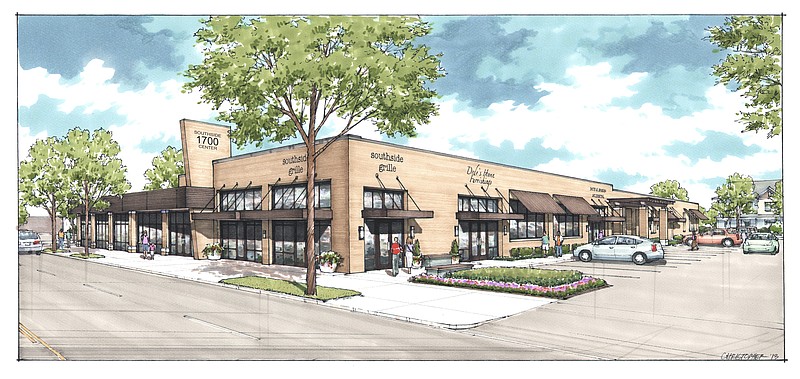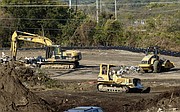In the shadow of one of Chattanooga's biggest poultry plants, hundreds of new apartments, offices and retail space are on the drawing board off South Broad Street.
The plant - the subject of jokes over the years for the odor that at times wafts from the site - was once seen as a liability to the Southside. Now some builders seem to view the poultry plant as no big deal as they envision tens of millions of dollars in new development.
The area around the Pilgrim's Pride plant is part of a South Broad Street corridor that's become a hot spot as more people become interested in living, working and playing downtown.
"There has been a huge push by people voting with their feet and their dollars who want to be in the urban core," said Chattanooga attorney and developer Mike Mallen.
Marcus Lyons, a Chattanooga real estate broker, said he believes the majority of infill development downtown over the next decade will take place from Main Street to the foot of Lookout Mountain.
"Unlike the North Shore, the topography is a lot easier to develop," he said. "The land is flat, and you're not having to work around ridges and hills."
Lyons represented a Knoxville developer who recently paid $1.5 million for land next to the poultry plant at South Broad and Main streets. The developer foresees a $15 million project with 139 apartments around South Broad and West 17th streets.
Lyons doesn't see the plant as a problem - he said many homes already have been built within two-tenths of a mile.
In fact, just across the road, Chattanooga developer John Straussberger is planning a $5 million mixed-use project in a former Chevrolet dealership. A medical office, a restaurant, 16 loft apartments and other uses are eyed for the site, said Straussberger, president of The Strauss Co.
He said the apartments will be more upscale than most built downtown, with rents ranging from $1,150 to $1,700 a month. But, he added, prices could change because of increasing demand.
"It's almost like every week someone is doing an apartment complex on the Southside," Straussberger said.
Ben Pitts, a commercial real estate agent for Herman Walldorf & Co. working on Straussberger's project, said the poultry plant is "a fact of life."
"The reality is it's not as bad as the reputation," Pitts added. "I'm not going to say you'll never get a whiff down there. It's not a frequent as you might think."
At the same time, some planners have talked about the plant relocating and a 2012 development plan called for it to be removed. The Broad Street plant and a sister facility near the Chattanooga Choo Choo together employ about 1,300 people. A number of employees are said to live relatively close by.
But at least two other developers see more than 200 more housing units on South Broad. One site is just a few blocks from the plant. And Collier Construction has started site work just behind the Southern Saddlery Building closer to St. Elmo.
That planned $20 million development is to hold single-family homes, townhouses and commercial space.
Ed McMahon, a senior resident fellow for the Urban Land Institute in Washington, D.C., said downtown living is a big trend nationally.
"For the first time in 50 years, a majority of American cities are growing faster than the surrounding suburbs," he said.
In Chattanooga, the North Shore has seen new apartments going up. More are planned, and a number of residential projects are slated for the center of downtown and the Southside.
McMahon cited changes in the economy and technology for the shift, especially among young people.
"They like a walkable neighborhood; they own fewer cars," he said, and they want to be in a place that offers plenty to do.
Another factor is older people who are downsizing their residences and interested in many of the same things, he said.
But, the influx of people downtown can push out existing residents, often lower-income, as neighborhoods experience rising housing costs and gentrification.
"Cities are having to think more of how to provide workforce housing on the lower end of the income stream," McMahon said. That might mean making sure existing affordable housing is preserved, he said.
Kim White, who heads the downtown nonprofit redevelopment group River City Co., said the South Broad development continues growth in the Main Street area in recent years. And extending the Tennessee Riverwalk to St. Elmo will push the trend, she said.
Mallen, a partner in the Chattanooga group that owns the 140-acre former U.S. Pipe/Wheland Foundry site off South Broad, foresees an eventual half-billion-dollar development there.
His group has hired Chicago-based commercial real estate company Jones Lang LaSalle to help find "a master developer" to take on large-scale projects such as new residential and commercial construction.
"We've declined a lot more obvious offers to do things in the big-box [store] category," Mallen said. "As we've said, we're going to make this a generational improvement."
Concerning the poultry plant, McMahon said zoning ordinances are used to be designed to separate land uses.
"What you're finding today is you can have some sort of industrial use in the same neighborhood with people and stores," he said. McMahon added that strict controls need to be on place on issues such as runoff and pollution.
The thinking is how to design those in a way to provide good jobs without negatively impacting the environment around them, McMahon said.
Contact Mike Pare at mpare@timesfreepress.com or 423-757-6318.

